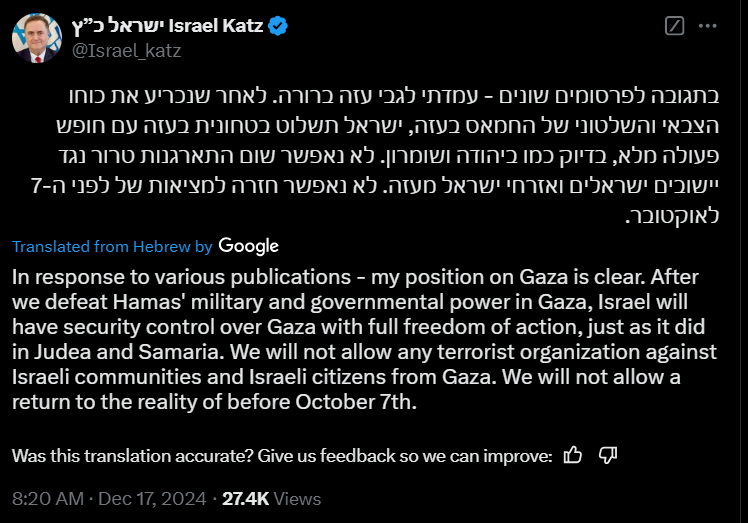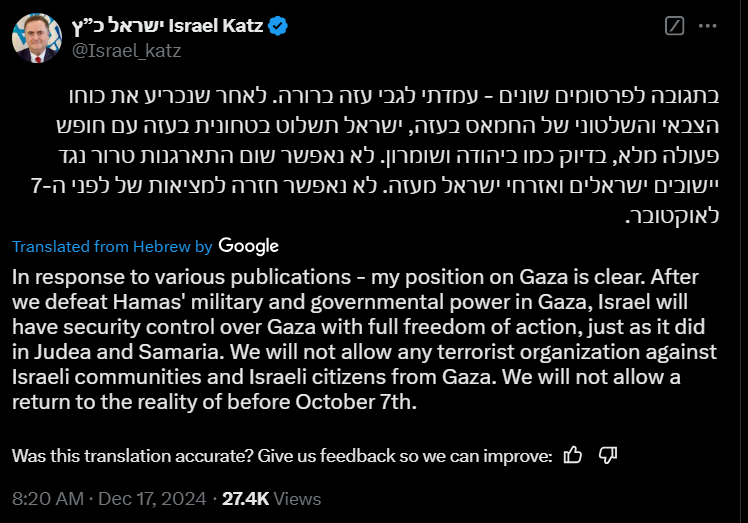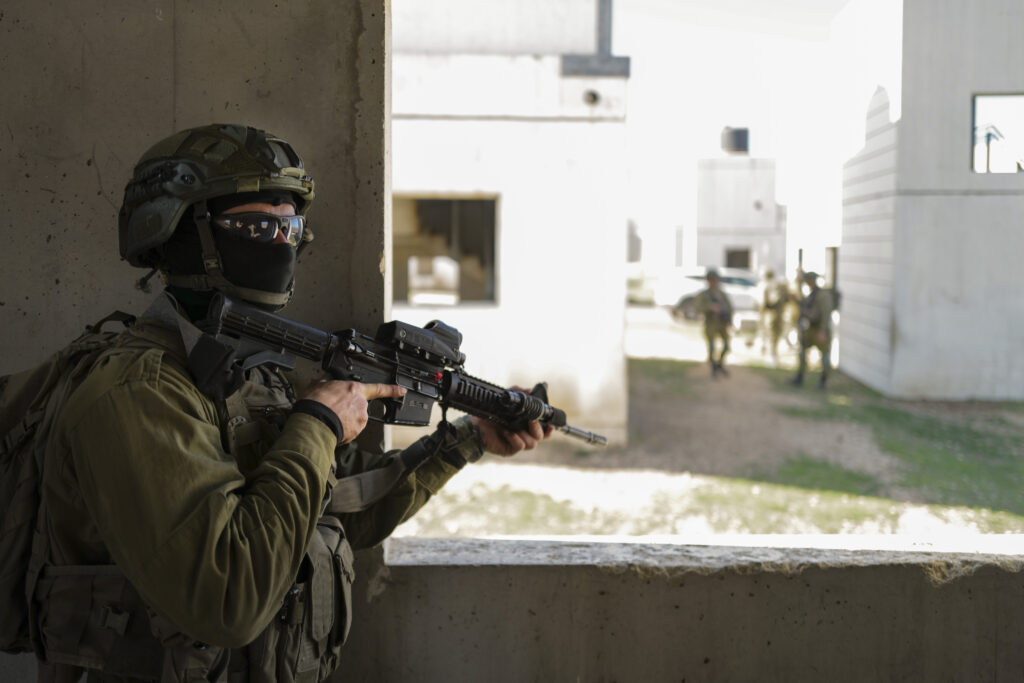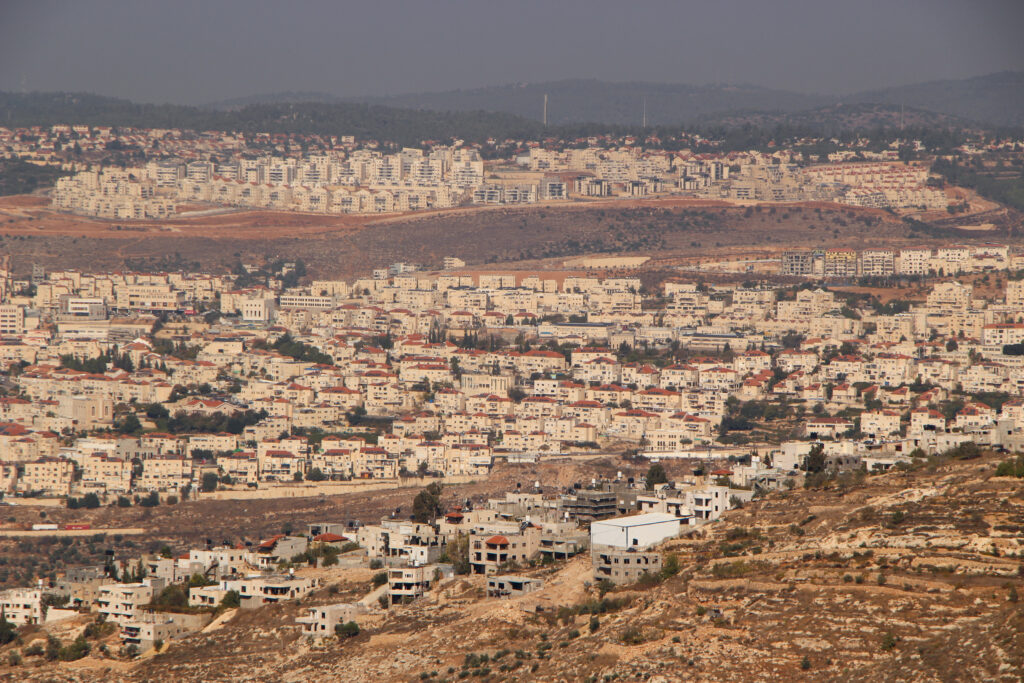
Gaza Control Post-War, Syria Rebels Stick to Agreement, and Housing Growth in Judea and Samaria
Israeli Defense Minister Israel Katz Reaffirms Security Control Over Gaza Post-Conflict
In a recent clarification, Israeli Defense Minister Israel Katz stated that Israel will continue its security oversight in the Gaza Strip once hostilities with Hamas end. Katz, addressing rumors, made it clear on social media that Israel’s security approach in Gaza will mirror its actions in Judea and Samaria, allowing for complete operational freedom to prevent terrorist activities. This declaration followed reports by Channel 12 suggesting Katz had communicated to a U.S. official in private that Israel had no interest in maintaining governance or military control over Gaza’s population post-war.

During ongoing conflicts, Israel’s 98th Division, which had been stationed in Lebanon combating Hezbollah forces, is being redeployed to Gaza. This shift follows a temporary ceasefire with Hezbollah that began on November 27, allowing IDF forces to strategically move back to Gaza from Lebanon.
Syrian Rebel Leader Commits to 1974 Disengagement Agreement With Israel
On December 8, 2024, the leader of the Syrian Islamist group Hayat Tahrir al-Sham (HTS), Ahmad al-Sharaa—also known as Abu Mohammad al-Julani—spoke in Damascus about continuing to honor the 1974 Disengagement of Forces Agreement, which concluded the 1973 Yom Kippur War. During his address at the Umayyad Mosque, al-Sharaa appealed to the international community to ensure Israel’s compliance with the agreement, highlighting that the Israeli military’s presence in the demilitarized zones along the Syrian border and other areas was no longer necessary.
Al-Sharaa’s comments come in the wake of the Assad regime’s downfall, which he claims eliminates the need for Israeli military presence in the Syrian Golan Heights, arguing that the threat posed by Hezbollah and other groups backed by Iran has subsided.

Since the Assad government’s collapse, Israeli forces have positioned themselves within and around the buffer zone, notably on the Syrian side of Mount Hermon. Additionally, the Israeli Air Force has carried out multiple airstrikes on military targets formerly under Assad’s control.
The new Syrian leadership criticized Israel on Saturday for its military actions and presence in several demilitarized zones within the Syrian Golan Heights, suggesting that Israel’s justifications are no longer valid and accusing it of breaching the engagement terms.
In response, the office of Prime Minister Benjamin Netanyahu, on December 12, expressed concern about the potential security risks posed by jihadist groups in the absence of the Syrian regime, emphasizing the necessity of Israeli intervention to prevent attacks similar to those on October 7. The statement from Netanyahu’s office indicated that the Israeli military’s engagement in the buffer zone is intended to be temporary, pending the establishment of a new force committed to the 1974 agreement and the restoration of secure conditions along the border.
Major Housing Expansion Approved for Judea and Samaria by IDF
The IDF Central Command has enacted a new order, spearheaded by Maj. Gen. Avi Bluth, that is set to significantly increase housing construction in the regions of Judea and Samaria. This order extends certain urban planning legislations previously limited to areas within Israel’s pre-1967 boundaries. The initiative is expected to facilitate the development of tens of thousands of new homes in key cities such as Modi’in Illit and Ariel by simplifying the approval processes and offering tax incentives.

This expansion effort is part of a broader government strategy to integrate and normalize Judea and Samaria akin to other Israeli regions, as described by Finance Minister Bezalel Smotrich and Construction and Housing Minister Yitzhak Goldknopf. They emphasized that this policy not only addresses the housing shortage but also reinforces national security and continuity in these historically significant areas.
The post Gaza Control Post-War, Syria Rebels Stick to Agreement, and Housing Growth in Judea and Samaria appeared first on Israel365 News.
Israel in the News